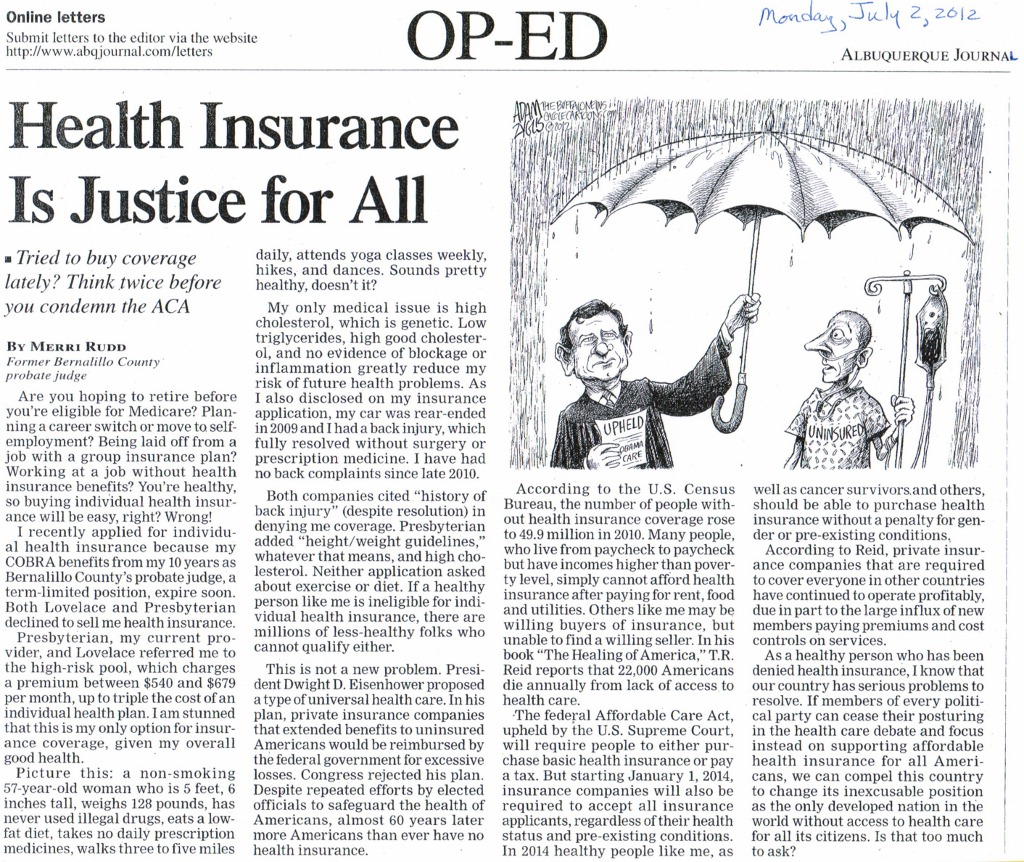ABQJournal Online » Health Insurance Is Justice for All
By Merri Rudd / Former Bernalillo County probate judge on Mon, Jul 2, 2012
 Are you hoping to retire before you’re eligible for Medicare? Planning a career switch or move to self-employment? Being laid off from a job with a group insurance plan? Working at a job without health insurance benefits? You’re healthy, so buying individual health insurance will be easy, right? Wrong!
Are you hoping to retire before you’re eligible for Medicare? Planning a career switch or move to self-employment? Being laid off from a job with a group insurance plan? Working at a job without health insurance benefits? You’re healthy, so buying individual health insurance will be easy, right? Wrong!
I recently applied for individual health insurance because my COBRA benefits from my 10 years as Bernalillo County’s probate judge, a term-limited position, expire soon. Both Lovelace and Presbyterian declined to sell me health insurance.
Presbyterian, my current provider, and Lovelace referred me to the high-risk pool, which charges a premium between $540 and $679 per month, up to triple the cost of an individual health plan. I am stunned that this is my only option for insurance coverage, given my overall good health.
Picture this: a non-smoking 57-year-old woman who is 5 feet, 6 inches tall, weighs 128 pounds, has never used illegal drugs, eats a low-fat diet, takes no daily prescription medicines, walks three to five miles daily, attends yoga classes weekly, hikes, and dances. Sounds pretty healthy, doesn’t it?
My only medical issue is high cholesterol, which is genetic. Low triglycerides, high good cholesterol, and no evidence of blockage or inflammation greatly reduce my risk of future health problems. As I also disclosed on my insurance application, my car was rear-ended in 2009 and I had a back injury, which fully resolved without surgery or prescription medicine. I have had no back complaints since late 2010.
Both companies cited “history of back injury” (despite resolution) in denying me coverage. Presbyterian added “height/weight guidelines,” whatever that means, and high cholesterol. Neither application asked about exercise or diet. If a healthy person like me is ineligible for individual health insurance, there are millions of less-healthy folks who cannot qualify either.
This is not a new problem. President Dwight D. Eisenhower proposed a type of universal health care. In his plan, private insurance companies that extended benefits to uninsured Americans would be reimbursed by the federal government for excessive losses. Congress rejected his plan. Despite repeated efforts by elected officials to safeguard the health of Americans, almost 60 years later more Americans than ever have no health insurance.
According to the U.S. Census Bureau, the number of people without health insurance coverage rose to 49.9 million in 2010. Many people, who live from paycheck to paycheck but have incomes higher than poverty level, simply cannot afford health insurance after paying for rent, food and utilities. Others like me may be willing buyers of insurance, but unable to find a willing seller. In his book “The Healing of America,” T.R. Reid reports that 22,000 Americans die annually from lack of access to health care.
The federal Affordable Care Act, upheld by the U.S. Supreme Court, will require people to either purchase basic health insurance or pay a tax. But starting January 1, 2014, insurance companies will also be required to accept all insurance applicants, regardless of their health status and pre-existing conditions. In 2014 healthy people like me, as well as cancer survivors and others, should be able to purchase health insurance without a penalty for gender or pre-existing conditions.
According to Reid, private insurance companies that are required to cover everyone in other countries have continued to operate profitably, due in part to the large influx of new members paying premiums and cost controls on services.
As a healthy person who has been denied health insurance, I know that our country has serious problems to resolve. If members of every political party can cease their posturing in the health care debate and focus instead on supporting affordable health insurance for all Americans, we can compel this country to change its inexcusable position as the only developed nation in the world without access to health care for all its citizens. Is that too much to ask?
